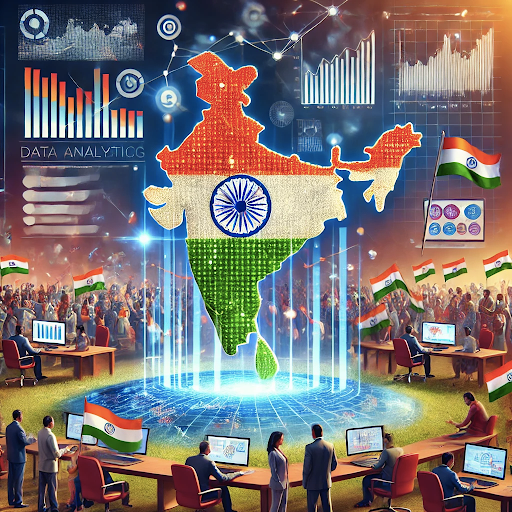Data analytics has become a game-changer in political marketing in recent years, especially in India, where elections are a colossal affair.
With its vast and diverse electorate, political campaigns in India have always faced the challenge of effectively reaching voters. The rise of data analytics has provided political parties with powerful tools to gain deeper insights into voter behavior, segment the electorate more effectively, and tailor their messages to resonate with different groups of people. This article explores how data analytics is transforming political marketing in India, enhancing campaign strategies, and enabling political parties to engage with voters more personalized and effectively.
Understanding Data Analytics in Political Marketing
Data analytics refers to collecting, analyzing, and interpreting large data sets to uncover patterns, trends, and insights. In the context of political marketing, data analytics involves studying voter behavior, demographics, preferences, and social media trends to optimize campaign strategies. Political parties now use sophisticated tools and algorithms to analyze everything from voting patterns to social media interactions, providing them with valuable information to craft more precise and effective campaigns.
The Role of Big Data
One of the most significant advantages of data analytics in Indian political marketing is the ability to work with big data. India’s digital revolution has made enormous data available to political parties. With nearly 700 million internet users, much of the electorate’s behavior is online through social media, news consumption, or digital surveys.
Predictive Analytics
Predictive analytics is another critical aspect of data analytics in political marketing. By analyzing historical voting patterns and current voter preferences, predictive models can forecast which regions, communities, or individuals are likely to vote a particular way. This allows political parties to prioritize their efforts, allocate resources more efficiently, and tailor their messages to specific voter segments. In India, where elections span multiple phases and regions, predictive analytics ensures that campaigns are responsive and anticipatory.
Personalizing Campaign Messages
One of the most remarkable impacts of data analytics on Indian political marketing is the ability to personalize messages for different voter segments. A one-size-fits-all approach to campaigning is ineffective in a country as diverse as India, with varying cultural, social, and economic backgrounds. Data analytics enables political parties to craft targeted messages that resonate with specific groups, from urban millennials to rural farmers.
Micro-Targeting Voters
Micro-targeting, a key technique facilitated by data analytics, involves identifying small, specific groups of voters and tailoring messages that appeal to their unique interests, concerns, and needs. For example, a political campaign may use data to identify a group of young voters in a particular constituency concerned about job opportunities. The campaign can then focus its messaging on youth employment, creating a more direct connection between the party’s policies and the voter’s concerns.
Optimizing Election Campaigns with Data-Driven Insights
Data analytics has also made it possible for political campaigns to be more efficient and focused. Instead of relying on traditional methods such as large rallies and door-to-door campaigning, parties can now gather real-time feedback and adapt their strategies accordingly.
Resource Allocation
Elections in India are resource-intensive, and effective allocation of time, money, and manpower is crucial for success. Data analytics helps political campaigns identify high-priority areas where voter engagement is critical, allowing them to focus resources on key constituencies that could swing the election. By analyzing factors such as past voting trends, demographics, and even issues that matter most to voters in a particular region, campaigns can make more informed decisions about where to invest their efforts.
Real-Time Feedback and Sentiment Analysis
Data analytics enables political parties to track public sentiment in real-time through sentiment analysis. By monitoring social media platforms like Twitter, Facebook, and WhatsApp, political campaigns can gauge how the public receives their messages and adjust their strategies if necessary. Sentiment analysis tools can scan large amounts of online content, detecting shifts in voter sentiment or highlighting emerging issues that could influence the election.
The Rise of Social Media Analytics
In India, social media has become a powerful tool in political campaigns, and its influence continues to grow. Platforms such as Facebook, Twitter, Instagram, and WhatsApp have become crucial channels for political communication, allowing parties to reach millions of voters with just a few clicks. Social media analytics tools help political campaigns monitor discussions, identify trends, and understand voter opinions at a granular level.
Influencer Marketing
Data analytics also plays a crucial role in influencer marketing, a growing trend in Indian political campaigns. By identifying key social media influencers—celebrities, activists, or even ordinary citizens with a large following—political parties can partner with these individuals to amplify their message. Data analytics helps campaigns find the right influencers who align with their values and can sway public opinion, making their outreach efforts more impactful.
Tracking Online Engagement
Social media platforms offer detailed analytics on how voters interact with political content. Metrics such as likes, shares, comments, and engagement rates allow campaigns to assess the effectiveness of their posts and advertisements. This data can be used to fine-tune messaging and improve voter outreach strategies..
Overcoming Challenges and Ethical Concerns
While data analytics has proven immensely beneficial, its use in political marketing also raises concerns regarding privacy, misinformation, and the ethical implications of micro-targeting. Data collection must be transparent, ensuring voter data is handled responsibly and ethically. Political parties must also ensure that their use of data does not contribute to spreading false information or manipulating public opinion.
Ensuring Transparency
To address these concerns, Indian electoral authorities have begun implementing stricter regulations on digital campaigning and data usage. Political parties must disclose the use of paid advertisements and ensure that their digital strategies comply with ethical standards. Transparency in data usage is essential for maintaining trust in the electoral process, and political campaigns must ensure that they are not crossing ethical boundaries in the pursuit of votes.

